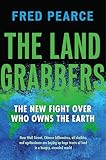The land grabbers : the new fight over who owns the Earth / Fred Pearce.
Material type: TextLanguage: English Publication details: Boston : Beacon Press, c2012.Description: x, 326 pages : maps ; 23 cmISBN:
TextLanguage: English Publication details: Boston : Beacon Press, c2012.Description: x, 326 pages : maps ; 23 cmISBN: - 9780807003411 (paperback : alk. paper)
- 0807003417 (paperback : alk. paper)
- 333.3
- HD 111 P359l 2012
| Item type | Current library | Home library | Collection | Shelving location | Call number | Copy number | Status | Date due | Barcode |
|---|---|---|---|---|---|---|---|---|---|
 Libro
Libro
|
Biblioteca Juan Bosch | Biblioteca Juan Bosch | Ciencias Sociales | Ciencias Sociales (3er. Piso) | HD 111 P359l 2012 (Browse shelf(Opens below)) | 1 | Available | 00000165160 |
Includes bibliographical references and index.
Land Wars: Gambella, Ethiopia: tragedy in the commons
Chicago, USA: the price of food
Saudi Arabia: plowing in the petrodollars
South Sudan: up the Nile with the capitalists of chaos
White Men in Africa: Yala Swamp, Kenya: one man's dominion
Liberia: the resource curse
Palm Bay, Liberia: return of the oil palm
London, England: pinstripes and pitchforks
Across the Globe: Ukraine: Lebensraum
Western Bahia, Brazil: Soylandia
Chaco, Paraguay: Chaco apocalyptico
Latin America: the new conquistadors
Patagonia: the last place on Earth
Australia: under the shade of a coolibah tree
China's Backyard: Sumatra, Indonesia: pulping the jungle
Papua New Guinea: "a truly wild island"
Cambodia: sweet and sour
Southeast Asia: rubber hits the road to China
African Dreams: Maasailand, Tanzania: the white people's place
South Africa: green grab
Africa: the second great trek
Mozambique: the biofuels bubble
Zimbabwe: on the fast track
The Last Enclosure: Central Africa: laws of the jungle
Inner Niger Delta, Mali: West African water grab
Badia, Jordan: on the commons
London, England: feeding the world
This book reveals the land grab taking place around the world and how corporate and governmental promises about the benefits of development are masking environmental and social destruction and the transfer of wealth out of host countries. Wall Street, Chinese billionaires, oil sheikhs, and agribusiness are buying up huge tracts of land in a hungry, crowded world. Fearing future food shortages or eager to profit from them, the world's wealthiest and most acquisitive countries, corporations, and individuals have been buying and leasing vast tracts of land around the world. The scale is astounding: parcels the size of small countries are being gobbled up across the plains of Africa, the paddy fields of Southeast Asia, the jungles of South America, and the prairies of Eastern Europe. The author, a science writer spent a year circling the globe to find out who was doing the buying, whose land was being taken over, and what the effect of these massive land deals seems to be. This book is an expose that reveals the scale and the human costs of the land grab, one of the most profound ethical, environmental, and economic issues facing the globalized world in the twenty-first century. The corporations, speculators, and governments scooping up land cheap in the developing world claim that industrial-scale farming will help local economies. But the author's research reveals a far more troubling reality. While some mega-farms are ethically run, all too often poor farmers and cattle herders are evicted from ancestral lands or cut off from water sources. The good jobs promised by foreign capitalists and home governments alike fail to materialize. Hungry nations are being forced to export their food to the wealthy, and corporate potentates run fiefdoms oblivious to the country beyond their fences. The story is populated with larger-than-life characters, from financier George Soros and industry tycoon Richard Branson, to Gulf state sheikhs, Russian oligarchs, British barons, and Burmese generals. We discover why Goldman Sachs is buying up the Chinese poultry industry, what Lord Rothschild and a legendary 1970s asset-stripper are doing in the backwoods of Brazil, and what plans a Saudi oil billionaire has for Ethiopia. Along the way, the author introduces us to the people who actually live on, and live off of, the supposedly "empty" land that is being grabbed, from Cambodian peasants, victimized first by the Khmer Rouge and now by crony capitalism, to African pastoralists confined to ever-smaller tracts. Over the next few decades, land grabbing may matter more, to more of the planet's people, than even climate change. It will affect who eats and who does not, who gets richer and who gets poorer, and whether agrarian societies can exist outside corporate control. It is the new battle over who owns the planet


There are no comments on this title.